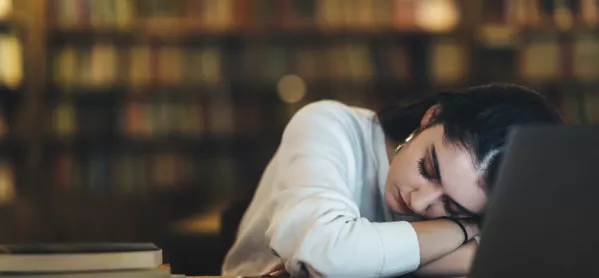More than a quarter of young people are not getting enough sleep, a study has found.
A lack of rest leaves pupils feeling sleepy and unable to concentrate on their schoolwork, according to the latest Health Behaviour in School-aged Children (HBSC) in England report.
Opinion: ‘We need to teach pupils the importance of sleep’
Related: ‘Working for Camhs is like living in a besieged city’
Mental health: ‘Wear clothes inside out to promote mental health’
It also indicates that increasing numbers of teenagers are experiencing periods of feeling low.
The World Health Organisation report, which is based on data from 3,398 young people in England, looks at areas ranging from physical health to life satisfaction.
It found that 27 per cent of young people report not having enough sleep to feel awake and concentrate on their lessons, with teenagers more likely to face this issue as they get older.
Around 17 per cent of 11-year-olds said they struggle with sleep, compared to 28 per cent of 13-year-olds and 42 per cent of 15-year-olds.
About a third - 32 per cent - of girls do not get enough sleep, compared to 23 per cent of their male classmates.
Examining mental wellbeing, the report says there has been a rise in the proportion of 15-year-olds who report feeling low once a week, increasing to 50 per cent from 40 per cent in 2014.
One in four - 25 per cent - of those questioned said they have self-harmed, and there has been a sharper rise in boys saying they have done so than girls.
Meanwhile a separate study led by Exeter University has found that school exclusions can be both the “cause and effect” of poor mental health in young people.
It says that children with mental health needs require support from when they are in primary school in order to avoid them being excluded.
Tamsin Ford, professor of child and adolescent psychiatry at Exeter University, said: “This research provides further evidence that poor mental health may be both cause and effect of exclusion from school.
“These children are often facing a wide range of challenges, and need both education and mental health practitioners to act quickly and effectively to prevent exclusion and improve both educational and health outcomes in later life.”
The HBSC report also shows that few youngsters are physically active on a daily basis, with just one in six - 15 per cent - saying they are active for at least an hour a day.
But seven in 10 - 70 per cent - said they take part in “vigorous” physical activity at least two to three times a week, with boys more likely to do so than girls (74 per cent compared to 63 per cent).
The study does show that young people are becoming less likely to take part in risky behaviour.
Just 3 per cent said they had smoked at least three times in the last 30 days while just 7 per cent reported drinking alcohol.
A fifth - 21 per cent - of 15-year-olds said they had tried cannabis, down from 41 per cent who said the same in 2002.
The proportion of 15-year-olds saying they have had sex has also dropped to 20 per cent in 2018, from over 35 per cent in 2002.
Martin Weber, a WHO programme manager for child and adolescent health and development, said: “The mental health of young people is as important as their physical health.
“The new HBSC report gives us a good insight into the problems young adolescents face and the effect it has on their health. Increase in sleep difficulties, feeling low and self-harm are just some of the issues that need to be addressed.”
Dr Ellen Klemera, senior research fellow at the University of Hertfordshire, which hosted the study, said: “Research on adolescent health has highlighted how important the second decade of life is for health and wellbeing, which is why this continued decline of emotional wellbeing is really worrying.
“Although there are far less reported incidences of risk behaviours, young people are facing a multitude of different challenges that other generations have not really experienced, such as the prominence of smartphones and social media. These can have a negative impact on wellbeing, particularly if they are exposed to cyberbullying or if it affects their sleep.”





